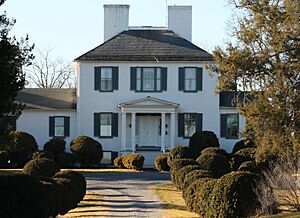Lawrence Berry Washington facts for kids
Quick facts for kids
Lawrence Berry Washington
|
|
|---|---|
| Birth name | Lawrence Berry Washington |
| Born | November 26, 1811 "Cedar Lawn" near Charles Town, Virginia (now West Virginia), U.S. |
| Died | September 21, 1856 (aged 44) Missouri River near Rocheport, Missouri, United States |
| Allegiance | United States |
| Service/ |
United States Army |
| Years of service | 1846–48 (USA) |
| Rank | Second lieutenant |
| Battles/wars | Mexican–American War |
| Relations | John Thornton Augustine Washington (father) Elizabeth Conrad Bedinger (mother) Benjamin Franklin Washington (brother) Robert Rutherford (great-grandfather) Samuel Washington (great-grandfather) George Washington (great-granduncle) |
| Other work | Lawyer, military officer, author, Forty-niner, Border Ruffian |
Lawrence Berry Washington (born November 26, 1811 – died September 21, 1856) was an American lawyer, soldier, and writer. He was also a member of the famous Washington family, being a great-grandnephew of the first U.S. President, George Washington.
Born in Virginia (now West Virginia), Lawrence was the oldest of 13 children. He first worked as a lawyer. Later, he became a second lieutenant in the Virginia Volunteers during the Mexican–American War. It's said that he even carried a sword belonging to his great-granduncle George Washington during the war! After the war, he joined the California Gold Rush as a "Forty-niner" in 1849, hoping to find gold. He also wrote a novel. In the 1850s, he moved to Missouri and became a "Border Ruffian". These were pro-slavery fighters during the conflicts over slavery in an area called Bleeding Kansas. Lawrence Washington died in 1856 by drowning in the Missouri River. His family believes he was murdered.
Contents
Early Life and Family History

Lawrence Berry Washington was born on November 26, 1811, at a plantation called "Cedar Lawn". This home was near Charles Town in Virginia (which is now West Virginia). His parents were John Thornton Augustine Washington and Elizabeth Conrad Bedinger Washington. Lawrence was their oldest son.
Through his father, Lawrence was a great-grandson of Samuel Washington, who was George Washington's brother. This made Lawrence a great-grandnephew of the first U.S. President. His mother's family also had important connections. She was related to Robert Rutherford, who served in the United States House of Representatives. Lawrence grew up in a very large family at Cedar Lawn. He had four brothers and eight sisters.
Because he had so many siblings, Lawrence didn't inherit a lot of money from his father in 1841. So, he and his brothers looked for ways to earn their own wealth. Lawrence studied law and started his own law practice in Charles Town by 1844. He also worked with his brother, Benjamin Franklin Washington, in real estate, selling land in Mason County.
Serving in the Military
Lawrence Washington became a second lieutenant in the Virginia Volunteers during the Mexican–American War. This war was fought between the United States and Mexico from 1846 to 1848. On December 6, 1846, Washington joined Company K of the Virginia Regiment in the United States Army. A few weeks later, he was chosen to be a second lieutenant.
Washington and his company left Charles Town on January 4, 1847. They arrived in Texas by March 12. During his time in Mexico, Lawrence Washington reportedly carried a sword that belonged to his famous great-granduncle, George Washington. A newspaper called the Richmond Enquirer wrote that this "precious relic" would inspire the Virginia soldiers to do great deeds.
In July 1847, a newspaper in Charles Town published a letter from Washington. In it, he praised General Zachary Taylor, who later became president. Washington believed Taylor would be a great president. After returning from the war, Washington wrote a letter in May 1848 to the United States Secretary of War, William L. Marcy. He offered to raise a new group of soldiers to fight in Oregon if he could become a captain.
Later Adventures and Conflicts
After the Mexican–American War, Lawrence Washington joined the Charles Town Mining Company. In 1849, he traveled to California with his brother, Benjamin Franklin Washington. They were "Forty-niners" during the California Gold Rush, hoping to strike it rich. However, there are no records that show Lawrence found any gold. While in California, he wrote a novel called A Tale to be Told Some Fifty Years Hence, which was published in 1853.
In the 1850s, Washington moved east to Missouri. There, he became involved in the "Bleeding Kansas" conflicts. This was a violent period when people fought over whether the new Kansas Territory would allow slavery. Lawrence fought as a "Border Ruffian", which meant he supported slavery. He also wrote poetry and articles for local newspapers.
In 1856, Washington was still serving as a Border Ruffian under Captain Henry Clay Pate. On June 2, 1856, Washington's group was attacked near Baldwin City, Kansas by anti-slavery fighters led by John Brown. This fight is known as the Battle of Black Jack. Washington left early in the battle to get help and received minor injuries. Captain Pate and his men were captured by John Brown.
His Death
Lawrence Washington died by drowning on September 21, 1856. He fell overboard from a steamboat on the Missouri River near Rocheport, Missouri. His family's descendants claim that he was murdered by Kansas "Jayhawkers". Jayhawkers were anti-slavery groups, and his family believed they killed him because he supported slavery and had fought as a Border Ruffian. A newspaper, the St. Louis Post-Dispatch, said that this incident "gave Kansas the name of 'Bloody'".
Lawrence Washington never married and did not have any children. His younger brother, John Thornton Augustine Washington, named his fifth child Lawrence Berry Washington in his memory. This child was born in San Antonio, Texas, in 1869.
 | Bessie Coleman |
 | Spann Watson |
 | Jill E. Brown |
 | Sherman W. White |

